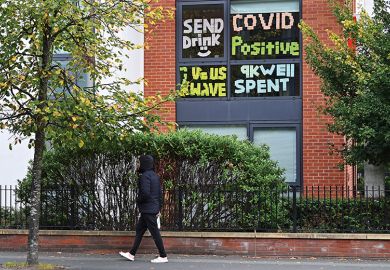There was limited transmission of Covid-19 between Cambridge students and the local community during the autumn term, according to a study.
The report by the University of Cambridge and the Covid-19 Genomics UK Consortium (COG-UK) found that clusters of cases during Michaelmas term were mostly confined to one college and were most often found in first-year students, suggesting that the university’s virus containment measures had been successful.
The authors analysed the genetic code of positive samples, using the symptomatic and asymptomatic coronavirus testing programmes within the university and samples from the local Cambridgeshire population, and sequenced 219 genomes from 490 positive individuals between weeks one and five of the term.
By comparing the genetic code of the samples, the researchers were able to work out whether positive cases were related.
The analysis showed that 90 per cent of university infections were confined to three “lineages” in week two, suggesting that a small number of transmissions at the start of term were responsible for most of the identified cases.
Through the sequencing, the researchers also found that outbreaks among students were not widely circulating through the local community population.
By week five, 5.3 per cent of the cases from the local community sample – 15 of 282 – were found to relate to the cases in the university sample. It is not yet clear whether those were individuals affiliated with the university, the report says.
In the largest cluster, of 139 cases, the analysis found that 135 were students, one was a staff member and only three were local cases.
In another cluster, 32 cases were identified by week three of the autumn term. Only two local samples were involved in this cluster, and the majority of the student cases were confined to one college.
Crucially, 50 per cent of the cases in this sample were asymptomatic, which demonstrated the importance of a strong testing programme, the report says.
According to the report authors, that there was so little transmission into the local community and that only a small number of lineages of the virus accounted for the majority of cases “reflected the efficacy of the university’s screening programme”.
Cambridge provided testing for all symptomatic students and staff within the university from 5 October, and asymptomatic screening is offered to all students resident in college accommodation.
The lack of diversity in the lineages also reflects “a possibly low incidence of infection among international students and/or successful quarantine and compliance with infection prevention control measures by international students on arrival”, according to the report.
Dinesh Aggarwal, a Wellcome clinical PhD fellow at Cambridge and a member of COG-UK, said “it appears that a few instances of the virus being introduced to the university account for the majority of cases of established transmission. This suggests to us that in most cases, when a virus was introduced, students behaving responsibly and complying with infection control measures helped stop the virus in its tracks.
“We hope it will be particularly reassuring that so far we have not found evidence of substantial transmission between our students and the local community.”
Patrick Maxwell, Regius professor of physics at Cambridge, added that “getting our screening programme up and running in time for the start of term was no small order, but we believe it has paid off. Asymptomatic screening can help identify cases of infection early, including where students are unaware of infection, and inform infection control measures. This has never been more urgent, with the emergence of the new variant.”
Register to continue
Why register?
- Registration is free and only takes a moment
- Once registered, you can read 3 articles a month
- Sign up for our newsletter
Subscribe
Or subscribe for unlimited access to:
- Unlimited access to news, views, insights & reviews
- Digital editions
- Digital access to THE’s university and college rankings analysis
Already registered or a current subscriber?








